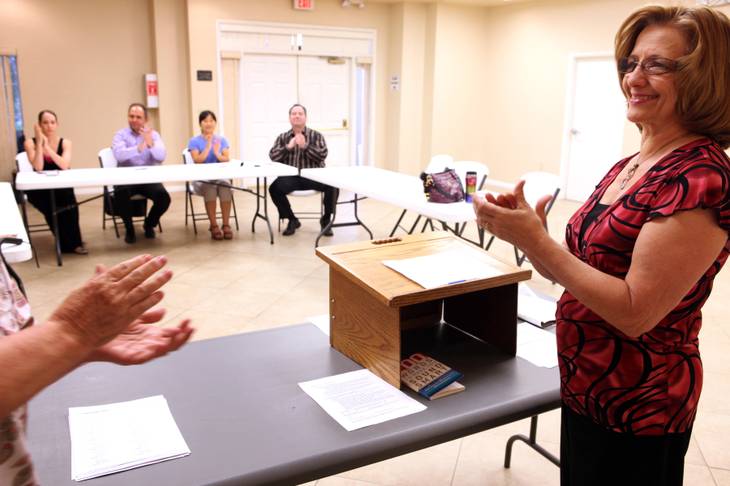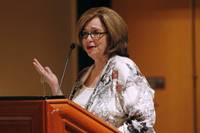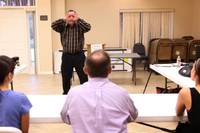For many people, speaking in public is scarier than dying.
Some worry about being judged or criticized. Others had a bad experience as a child.
Of course, some people are blessed with a natural aptitude for giving a great speech, but being an effective public speaker is an important skill everyone can master.
Even so, public speaking rarely is an innate ability. With practice, anyone can learn the gift of gab.
Cheri Hickman, a business coach with Queen Bee Biz, understands the paralyzing fear a public presentation can instill.
Public speaking snafus
Even seasoned public speakers make mistakes sometimes. Your notes may be ready, your PowerPoint uploaded, but that doesn’t mean your presentation will go smoothly.
“I had just been invited to speak at Lake of the Ozarks in Branson, Mo., and I forgot what town I was in. I got up in front of about 400 people at a lunch in Branson and I said, ‘It’s great to be in Dubuque, Iowa.’ I had just left Dubuque. The room got dead silent. None of my jokes worked. And I kept saying, ‘You know, these jokes worked really well in’ – and I would say the name of the town. And somebody in the audience said, ‘You’re in Branson, not Dubuque.’”
— Tom Skancke, president and CEO of the Las Vegas Global Economic Alliance
“It was during allergy season, and I have really bad allergies. That morning, I was itchy and sneezing and coughing, and a half-hour before we started, one of my colleagues gave me an antihistamine. I started the presentation, but I think a combination of my anxiety and the medicine made me kind of foggy. My heart was racing, my mouth was dry. I was getting really sweaty, and I was a little disoriented. I thought everybody noticed. No one probably did, but I drew attention to it and said, ‘I’m really sorry, I took some allergy medicine.’ I apologized over and over again. I couldn’t stop. I kept blaming it on the medicine. It was bad, so awkward.”
— Carole Fisher, president and CEO of Nathan Adelson Hospice
“I was making a speech to a bunch of people about a new project. I had to introduce all the participants, and it occurred to me, mid-speech, that one of the groups had changed names over the past few years. And I remembered that the breakup did not go very well. Using the wrong name would not go over well, but I couldn’t remember the current name of the group. All of this is going on in my mind as I’m making the speech: ‘What if I get the name wrong? Someone’s going to be really mad about this.’ To this day, I have no idea if I got it right, but I plowed through it with conviction. I always remember having that terrifying thought that I was going to completely mangle the name and insult somebody.”
— Rick Myers, president of the Thomas & Mack Development Group
“Years and years ago, I was involved in a travel agent presentation with about 400 travel agents, and we had some sports celebrities from Dallas. Well, I couldn’t remember one of the celebrities’ names. I had to go up on stage and introduce this person. So I had to ad lib until I could remember. I did a little song and dance until it finally came to me.”
— Rossi Ralenkotter, president and CEO of the Las Vegas Convention and Visitors Authority
“A few years ago, I spoke at a job fair in Oregon. I made reference to never turning down a job interview or opportunity because you never know where it will lead. This was sort of my big pep talk. But this kid in the audience looked totally unimpressed. I kind of picked on him, trying to be funny. I said, ‘What, you don’t want to be with anybody because you have a sick grandma at home?’ It turns out his grandma was dying that week. He went blank, and there wasn’t a sound in the room. I could have essentially fallen off the stage.”
— Billy Johnson, president and chief operating officer of the Las Vegas Wranglers
Fresh off a move from Texas to Wisconsin, Hickman was in the seventh grade when she had to present a report to her class. Because of her accent, nobody understood her. Her classmates laughed, and Hickman clammed up for years after.
“I would take an ‘F’ before I gave a report in front of the classroom,” Hickman recalled. “I would not get up.”
Public speaking is essential in the business world, not to mention many other careers. Avoiding it can hurt a person’s ability to network, close doors to promotions and new job opportunities and hinder an upward trajectory in the corporate world.
Hickman overcame her fears through Toastmasters International, a group that helps people develop public speaking abilities, and dedicated herself to practicing. She eventually became president of two Toastmasters clubs.
Amy Ayoub also has mastered the art of public speaking. She founded the Zen Speaker, which teaches businesspeople how to communicate and network.
Ayoub said the key to being a great public speaker isn’t charisma, as many people think. Plenty of people can be charismatic but uninteresting on stage.
Instead, she said, “great public speakers have one common thread, and, that is, they are authentic. They’re just being themselves.”
Even seasoned speakers, however, can feel pressure.
Ayoub, for example, testified earlier this year before the Nevada Legislature to ask lawmakers to strengthen sex trafficking laws. Ayoub was recruited to the sex trade industry as a young woman but escaped and has since founded several successful companies, been appointed to numerous state and federal commissions and raised millions for political and charitable causes.
“When I was preparing to speak in front of the Legislature, I used techniques that I use to prepare for any speech,” Ayoub said.
Preparation is the most important aspect of public speaking, the experts said.
“When I prepare, I know what I want to say and how I want to say it,” Hickman said.
Hickman writes out notes before every speech – key words and phrases that help her remember the topics she wants to hit.
Other effective public speakers use different techniques.
The experts say there’s no one way to prepare notes. The key is finding a layout that works best for you.
Some people prefer to use note cards; others hold pieces of paper that contain an outline or bullet points. Many presenters rely on PowerPoint presentations to move their speeches along and keep them focused.
Memorizing a speech is discouraged by the experts because it can come off as stiff and unnatural. It also opens up the speaker to losing his or her train of thought.
As for content, Ayoub recommended that speakers remain true to themselves.
If a person is funny, work a joke into the speech. If he or she is more of a straight shooter, get straight to the point.
Understanding an audience, and connecting with them, also is key. Knowing to whom you are speaking allows you to write an appropriate speech for the crowd.
An unresponsive audience can hurt a speech. Apathy among a crowd can make a presenter second guess himself.
“Ideally, a speaker would create or craft claims and use evidence and examples that would be appealing to their audience,” said Jacob Thompson, a communication professor and coach of the UNLV debate team.
A speech for a group of school parents, for example, should necessarily sound different than one delivered to a group of investment bankers.
“Everyone wants you to succeed as much, if not, more than you,” Thompson said.
Ayoub agreed. People attend a presentation for a reason, she said, and want to listen, learn and share.
“They’re there to see what you have to say,” she said. “They’re there to receive something. They’re not there to criticize you.”
Good speeches depend on making a connection with an audience, and doing that takes personal attention – eye contact, open body language, a simple delivery. That doesn’t change in front of a big crowd.
Ayoub suggested people approach speaking to a large audience the same way they would a speech for one or two people.
“When I connect with one person, it’s because I’m looking at them,” Ayoub said. “I’m speaking concisely. I’m understandable. All these things that make a nice conversation translate on stage. You might be looking at more than one person, but the style is the same.”
Preparation also goes beyond researching and writing. Thompson suggests that people practice giving their speech in front of a simulated audience, if possible, in the location where it will take place. He also recommends that people take every chance available in daily life to talk in front of groups.
“If you take every opportunity to be a public speaker, the better you will be at it,” he said. “There is no substitute for practice.”
There are almost 60 Toastmaster clubs in the Las Vegas Valley. Most meet once or twice a month at schools, churches or casinos.
Members use egg timers to time speeches and counters to count pauses, including how many times a person says “ah” or “um.” They give feedback and ask for opinions on how to improve.
“I was able to get over the fear and get more refined in my delivery because of Toastmasters,” Hickman said. “The first time I got up and spoke in front of 40 people, I just read everything word for word. I felt like my knees were knocking. My heart was pounding.”
Now she delivers polished speeches like a pro.
Thompson invites students to his office to practice in a low-stress environment. He offers both pointers and soothing words.
“I try to work hard with the students who are very anxious about public speaking to remind them that preparation is critical and the practice is important,” Thompson said. “I try and get to the root of their fear. One of the keys with dealing with that is to say, ‘If you practice, you’ll be much better.’”
Ultimately, the most important part of preparing is keeping a positive attitude right before a speech.
“Visualize having a wonderful reaction and the joy of delivering a speech,” Ayoub said. “So many people are so nervous, the affirmation makes you more nervous.”


